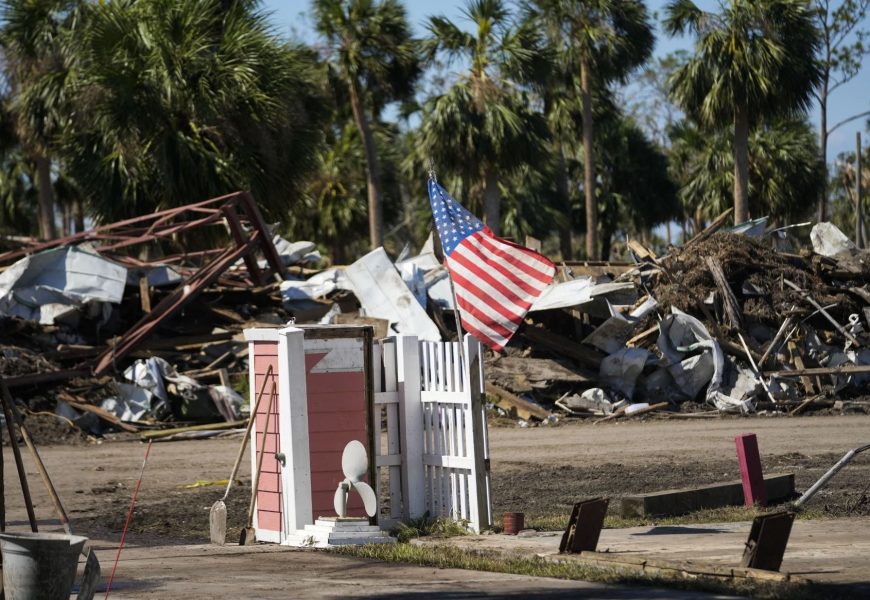Hurricane Helene, a Category 4 storm, tore through the Gulf of Mexico, leaving a trail of destruction and devastation in its wake. The powerful hurricane ravaged southern states like Florida, Georgia, the Carolinas and Kentucky, plunging thousands into crisis. As the floodwaters surged through homes and neighborhoods, many Americans found themselves internally displaced, with limited resources and terrified of what was to come. In some towns and cities, water levels rose to over 6 feet, submerging roads and leaving residents trapped in their homes. Some were forced to make unimaginable decisions, with some needing to surrender pets should they have been asked to evacuate.
Hurricane Helene’s death toll only continues to rise, with over 200 casualties reported in the past week, according to the New York Times, and that number is only expected to rise. People on social media and across various news outlets have made comparisons to Hurricane Katrina, another hurricane that, in August 2005, left massive devastation in its wake.
The death count from Hurricane Helene continues to rise, with rescue and relief responders working around the clock to try and locate survivors or victims who lost their lives. Americans across the country have donated and offered support to those displaced due to the disaster. Despite this support, the devastation caused as a result of the hurricane requires continuous funding and assistance.
Hurricane Helene impacted several popular areas, including the Blue Ridge Mountains, which span multiple states, including North and South Carolina, Maryland, Virginia and Tennessee. Due to the storm’s severe impact on North Carolina, the threat of landslides and erosion has increased, with unstable terrain creating incredibly dangerous conditions for residents. Another notable area affected was the Appalachian Trail, a 2,220-mile route through the Southeast. The trail was devastated, with roads torn apart, the ground fractured and trees uprooted along the storm’s path.
Margeret Minnis, an Environmental Studies professor at the University, stated, “People who live in the mountains never expect to see such dramatic rainfall events; climate change is causing warmer oceans, more water evaporating, and rainfalls that surpass all previous rain events, not just on the East Coast of America, but all over the world. Environmental scientists have been predicting this for decades, but now, we see the phenomenon unfolding, and it seems to be worse than anyone predicted.”
Lilah McCormack, chair of the Nature Club at the Pleasantville Campus, shared her genuine concerns regarding climate change affecting the area Helene hit, “You can see how strong these hurricanes are becoming and the impact climate change has had on hurricanes as well as natural disasters, these beautiful places and people’s homes are being ravaged left and right, I can’t imagine losing all of my belongings, my sympathy goes out to all of the people affected by this tragedy.”
McCormack also emphasized that climate change is worsening and that we must find a way to combat environmental disasters. She suggested battling intense weather conditions by implementing anti-flooding infrastructure to prevent widespread damage from future hurricanes.
In response to the disaster, officials swiftly mobilized to aid and support affected families. The White House confirmed that FEMA provided essential aid to civilians, including meals, tarps, and generators. The statement highlighted that “around 11.5 million meals have been sent out, and 12.6 million liters of water have been sent to struggling families, 45 million dollars in individual assistance was available for survivors.” President Biden also addressed the nation on X (formerly Twitter), assuring, “To all of those affected by the hurricane, my Administration– and the nation– have your back.”
Hurricane Helene’s devastating impact across multiple states has prompted a robust disaster relief response from the United States government. Towns in Florida and areas west of North Carolina have been severely affected by power outages, making communication with loved ones nearly impossible for those in Helene’s path. Officials, politicians, and the federal government have continued to provide support to the southeastern states in addressing the damage. Despite these efforts, ongoing assistance remains crucial for disaster relief and recovery.







